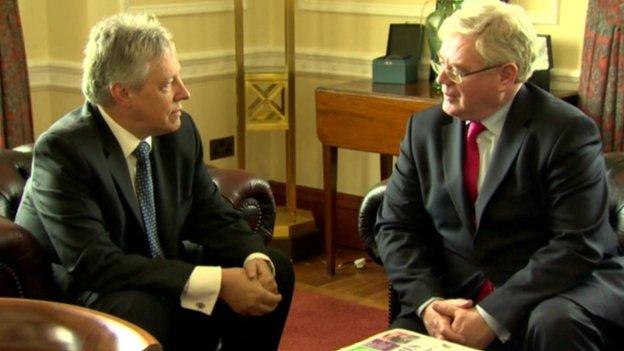Northern Ireland parties prepare for new talks
- Published

Irish deputy prime minister Eamon Gilmore held talks with Northern Ireland first minister, Peter Robinson
Preparations are under way for more intensive political talks about dealing with the past, parades and flags in Northern Ireland.
It is thought two three-day sessions will be convened by the first and deputy first ministers.
The five Stormont executive parties are being asked to name their delegations by Tuesday.
Irish Foreign Minister Eamon Gilmore is holding talks with the first and deputy first ministers.
After meeting him along with Martin McGuinness, Sinn Féin leader Gerry Adams said: "Sinn Féin believes that there is now an opportunity to sort out some of these outstanding matters we would have like to have sorted out long before this.
"We don't underestimate the difficulties, but we now have a window of opportunity.
"We've also separately agreed to meet with the British prime minister and with the taoiseach [Irish prime minister] and as soon as that can be arranged that will proceed."
Over the Christmas and New Year period US diplomat Dr Richard Haass and his associate, Dr Meghan O'Sullivan, failed in their attempts to reach all-party agreement about the past, parades, flags and emblems.
On Monday, Mr Gilmore said: "I think the experience in Northern Ireland is a case of trying and trying again.
"We have seen in the past that the various efforts made to reach agreement have sometimes had to be done on an incremental basis."
He said Dr Haass and Dr O'Sullivan had done much of the "heavy lifting" on the issues.
"I think the issues that now remain to be resolved are capable of being resolved," he added.
DUP MP Jeffrey Donaldson, one of the party's key negotiators during the Haass talks, said progress could be made if the will existed on all sides.
"All of the parties know the issues that need to be resolved and we remain hopeful that further progress can be made and that's why we are keen to intensify the discussions over the next few weeks before the summer," he said.
"I think that progress is possible if there is a will to resolve the issues that continue to separate us."
Ulster Unionist sources have indicated they will send a delegation to the new talks.
However, they are continuing to insist they will not engage in any negotiations about the legacy of the Troubles until after they have at least seen the outcome of the review by Lady Justice Hallett of the issue of On the Runs.
On the Runs is the term used to refer to people who are suspected of, but who have not been charged or convicted of paramilitary offences during the Troubles.
It was a process that involved letters being given to republican paramilitary suspects assuring them that they were not wanted by police anywhere in the UK.
Details of the On the Runs scheme came to light after the trial of a man suspected of the IRA bombing of Hyde Park in 1982 collapsed in London earlier this year.
John Downey, from County Donegal in the Republic of Ireland, had denied killing four soldiers in the attack.
A court ruled that he should not be tried because of the assurance contained in a letter that he had been given in error by the government.
The Hallett inquiry was ordered by Prime Minister David Cameron and is due to report during the summer.